

|
| Apache Geronimo > Index > Development > XML Schemas > Apache Geronimo v2.1 XML Schemas | User List | Dev List | Wiki | Issue Tracker |
|
Documentation for attributes-1.2Table of ContentsSchema Document Properties
Declared Namespaces
Schema Component Representation
<xsd:schema
targetNamespace="http://geronimo.apache.org/xml/ns/attributes-1.2" elementFormDefault="qualified" attributeFormDefault="unqualified">
... </xsd:schema>Global DeclarationsElement: attribute
Logical Diagram
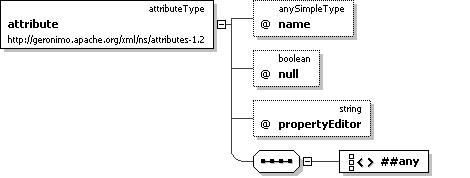
XML Instance Representation
<atts:attribute
name="anySimpleType [1] 'The name attribute provides the name of single attribute.' "null=" xsd:boolean [0..1] 'The null attribute defines if this atribute is null or not.' "propertyEditor=" xsd:string [0..1] 'The propertyEditor attribute defines the property editor class to be used to get the value of this attribute based on its string representation. If no editor is specified, then the type of the attribute, as declared by GBeanAttribute, is used to find a propertyEditor through the standard JavaBean search strategy.' "><!-- Mixed content --> <!-- '
xsd:anyType' super type was not found in this schema. Some elements and attributes may be missing. -->
Allow any elements from any namespace (lax validation). [0..*]
</atts:attribute>
Diagram
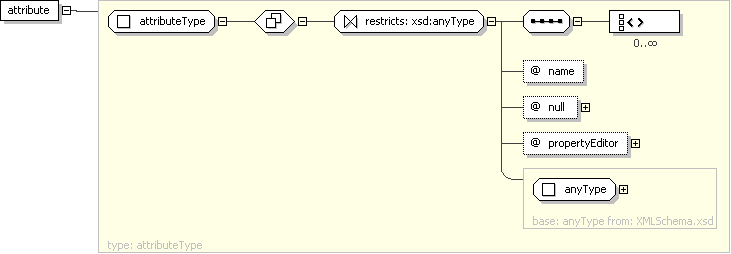
Schema Component Representation
Element: attributes
Logical Diagram
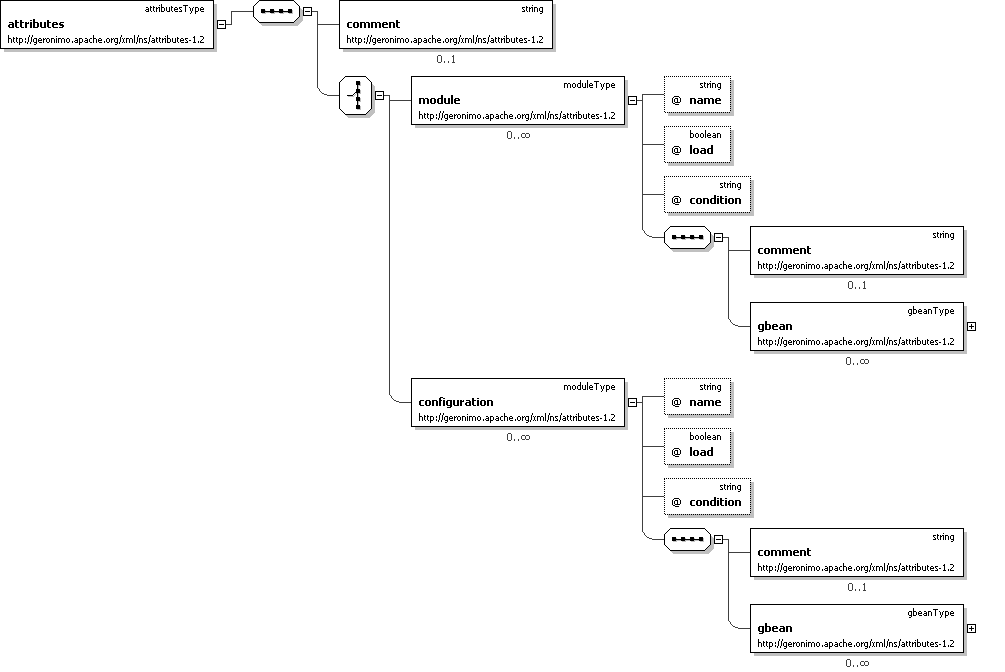
XML Instance Representation
Diagram

Schema Component Representation
Element: comment
Logical Diagram

Diagram

Schema Component Representation
Element: gbean
Logical Diagram
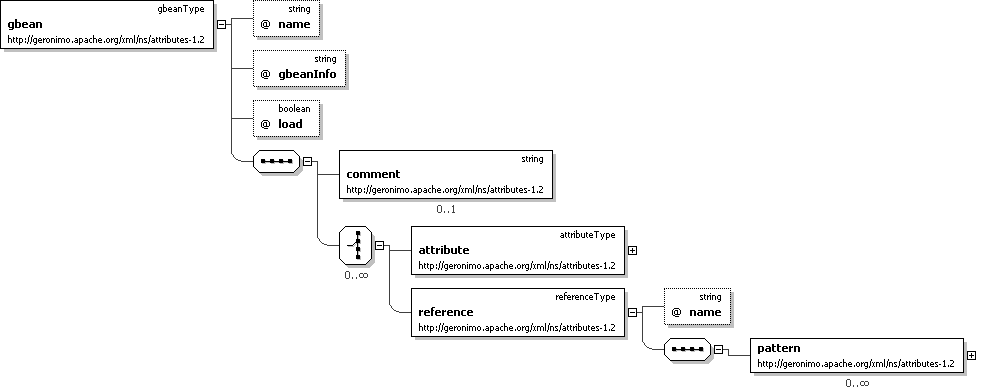
XML Instance Representation
<atts:gbean
name=" xsd:string [1] 'The name attribute specifies the name portion of the GBeanName.' "gbeanInfo=" xsd:string [0..1] 'The gbeanInfo attribute provide the gbean infomation for specified GBean.' "load=" xsd:boolean [0..1] 'The load attribute specifies if the gbean is to be loaded or not.' ">Start Choice [0..*] End Choice </atts:gbean>
Diagram
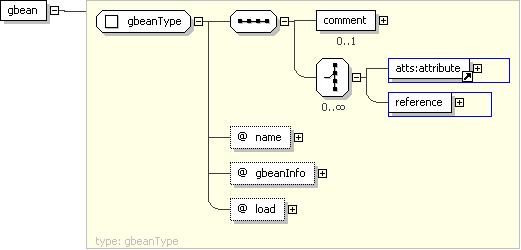
Global DefinitionsComplex Type: attributeType
XML Instance Representation
<...
name="anySimpleType [1] 'The name attribute provides the name of single attribute.' "null=" xsd:boolean [0..1] 'The null attribute defines if this atribute is null or not.' "propertyEditor=" xsd:string [0..1] 'The propertyEditor attribute defines the property editor class to be used to get the value of this attribute based on its string representation. If no editor is specified, then the type of the attribute, as declared by GBeanAttribute, is used to find a propertyEditor through the standard JavaBean search strategy.' "><!-- Mixed content --> <!-- '
xsd:anyType' super type was not found in this schema. Some elements and attributes may be missing. -->
Allow any elements from any namespace (lax validation). [0..*]
</...>
Diagram
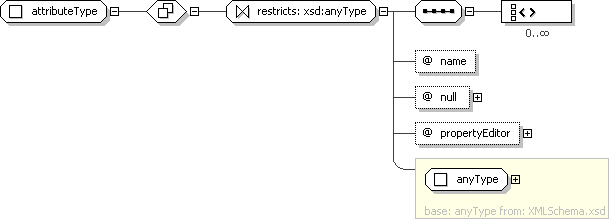
Schema Component Representation
<xsd:complexType
name="attributeType">
<xsd:complexContent
mixed="true"> </xsd:complexType><xsd:restriction
base="
xsd:anyType
"> </xsd:complexContent><xsd:sequence>
<xsd:any
minOccurs="0" maxOccurs="unbounded" processContents="lax"/> </xsd:sequence><xsd:attribute
name="name" use="required"/>
<--<xsd:attribute name="value" use="optional">-->
<--<xsd:annotation>-->
<--<xsd:documentation>-->
<--The value attribute is the value of specified-->
<--attribute.-->
<--</xsd:documentation>-->
<--</xsd:annotation>-->
<--</xsd:attribute>--> </xsd:restriction>Complex Type: attributesType
XML Instance Representation
Diagram

Schema Component Representation
<xsd:complexType
name="attributesType">
<xsd:sequence>
</xsd:complexType><xsd:choice>
</xsd:sequence><-- The config.xml file in 1.0 use configuration instead of module -->
</xsd:choice>Complex Type: gbeanType
XML Instance Representation
<...
name=" xsd:string [1] 'The name attribute specifies the name portion of the GBeanName.' "gbeanInfo=" xsd:string [0..1] 'The gbeanInfo attribute provide the gbean infomation for specified GBean.' "load=" xsd:boolean [0..1] 'The load attribute specifies if the gbean is to be loaded or not.' ">Start Choice [0..*] End Choice </...>
Diagram
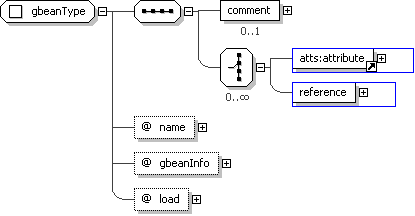
Schema Component Representation
<xsd:complexType
name="gbeanType">
<xsd:sequence>
</xsd:complexType><xsd:choice
minOccurs="0" maxOccurs="unbounded">
</xsd:choice> </xsd:sequence>Complex Type: moduleType
XML Instance Representation
Diagram
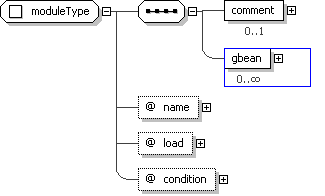
Schema Component Representation
<xsd:complexType
name="moduleType">
<xsd:sequence>
</xsd:sequence>
</xsd:complexType>Complex Type: referenceType
XML Instance Representation
<...
name=" xsd:string [0..1]"> <atts:pattern> [0..*]
</...><atts:groupId>
xsd:string </atts:groupId> [0..1]
'The name for group containing module to match. By default is set to wild card \'*\'.' <atts:artifactId>
xsd:string </atts:artifactId> [0..1]
'The name for module in a specified group to be matched. All the artifactId\'s should be unique within a group. If no articfactId is provided it will be defaulted to file name of the module file.' <atts:version>
xsd:string </atts:version> [0..1]
'The version number for the module formatted by dot separated numbers. If no version is provided it will be defaulted to latest available version matching other criterions.' <atts:type>
xsd:string </atts:type> [0..1]
'This element defines the type of the module. The type could be \'CAR\', \'JAR\', EAR\', \'WAR\' etc. If no type is provided it will be defaulted appropriately by the deployer depending upon type of deployed module.' <atts:module>
xsd:string </atts:module> [0..1]
'The value specified here should match the file name of the module referenced.' <atts:name>
xsd:string </atts:name> [1]
</atts:pattern>'The name element to identify the referenced GBean by name.'
Diagram
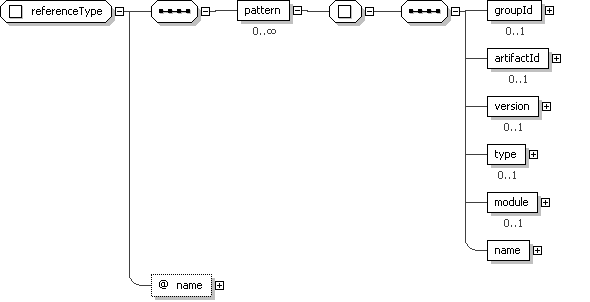
Schema Component Representation
<xsd:complexType
name="referenceType">
<xsd:sequence>
</xsd:complexType><xsd:element
name="pattern" minOccurs="0" maxOccurs="unbounded"> </xsd:sequence><xsd:complexType> </xsd:element><xsd:sequence>
</xsd:sequence> </xsd:complexType>LegendComplex Type:Schema Component Type
AusAddressSchema Component Name
If this schema component is a type definition, its type hierarchy is shown in a gray-bordered box.
The table above displays the properties of this schema component.
XML Instance Representation
<...
country="Australia"
>
<unitNo> string </unitNo> [0..1] <houseNo> string </houseNo> [1] <street> string </street> [1] Start Choice [1] <city> string </city> [1] <town> string </town> [1] End Choice <state> AusStates </state> [1] <postcode> string <<pattern = [1-9][0-9]{3}>> </postcode> [1] ? </...> The XML Instance Representation table above shows the schema component's content as an XML instance.
Schema Component Representation
<complexType
name="AusAddress">
<complexContent> <extension base=" Address "> <sequence> <element name="state" type=" AusStates "/> <element name="postcode"> <simpleType> <restriction base=" string "> <pattern value="[1-9][0-9]{3}"/> </restriction> </simpleType> </element> </sequence> <attribute name="country" type=" string " fixed="Australia"/> </extension> </complexContent> </complexType> The Schema Component Representation table above displays the underlying XML representation of the schema component. (Annotations are not shown.)
GlossaryAbstract (Applies to complex type definitions and element declarations). An abstract element or complex type cannot used to validate an element instance. If there is a reference to an abstract element, only element declarations that can substitute the abstract element can be used to validate the instance. For references to abstract type definitions, only derived types can be used. All Model Group Child elements can be provided in any order in instances. See: http://www.w3.org/TR/xmlschema-1/#element-all. Choice Model Group Only one from the list of child elements and model groups can be provided in instances. See: http://www.w3.org/TR/xmlschema-1/#element-choice. Collapse Whitespace Policy Replace tab, line feed, and carriage return characters with space character (Unicode character 32). Then, collapse contiguous sequences of space characters into single space character, and remove leading and trailing space characters.
Disallowed Substitutions
(Applies to element declarations). If substitution is specified, then substitution group members cannot be used in place of the given element declaration to validate element instances. If derivation methods, e.g. extension, restriction, are specified, then the given element declaration will not validate element instances that have types derived from the element declaration's type using the specified derivation methods. Normally, element instances can override their declaration's type by specifying an Key Constraint Like Uniqueness Constraint, but additionally requires that the specified value(s) must be provided. See: http://www.w3.org/TR/xmlschema-1/#cIdentity-constraint_Definitions. Key Reference Constraint Ensures that the specified value(s) must match value(s) from a Key Constraint or Uniqueness Constraint. See: http://www.w3.org/TR/xmlschema-1/#cIdentity-constraint_Definitions. Model Group Groups together element content, specifying the order in which the element content can occur and the number of times the group of element content may be repeated. See: http://www.w3.org/TR/xmlschema-1/#Model_Groups.
Nillable
(Applies to element declarations). If an element declaration is nillable, instances can use the Notation A notation is used to identify the format of a piece of data. Values of elements and attributes that are of type, NOTATION, must come from the names of declared notations. See: http://www.w3.org/TR/xmlschema-1/#cNotation_Declarations. Preserve Whitespace Policy Preserve whitespaces exactly as they appear in instances. Prohibited Derivations (Applies to type definitions). Derivation methods that cannot be used to create sub-types from a given type definition. Prohibited Substitutions (Applies to complex type definitions). Prevents sub-types that have been derived using the specified derivation methods from validating element instances in place of the given type definition. Replace Whitespace Policy Replace tab, line feed, and carriage return characters with space character (Unicode character 32). Sequence Model Group Child elements and model groups must be provided in the specified order in instances. See: http://www.w3.org/TR/xmlschema-1/#element-sequence. Substitution Group Elements that are members of a substitution group can be used wherever the head element of the substitution group is referenced. Substitution Group Exclusions (Applies to element declarations). Prohibits element declarations from nominating themselves as being able to substitute a given element declaration, if they have types that are derived from the original element's type using the specified derivation methods. Target Namespace The target namespace identifies the namespace that components in this schema belongs to. If no target namespace is provided, then the schema components do not belong to any namespace. Uniqueness Constraint Ensures uniqueness of an element/attribute value, or a combination of values, within a specified scope. See: http://www.w3.org/TR/xmlschema-1/#cIdentity-constraint_Definitions. |